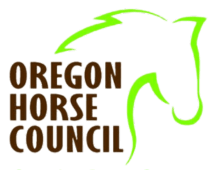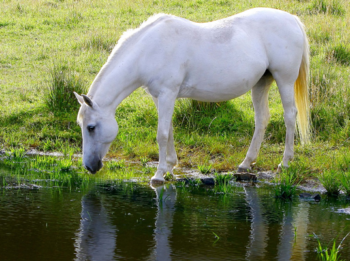We are right in the thick of summer, and you are likely seeing your horses attempt to keep cool by sweating. The process of sweating causes a decrease in core temperature through evaporative cooling at the skin surface. As high energy molecules evaporate from the skin, releasing energy absorbed from the body, the skin and superficial vessels decrease in temperature. Cooled venous blood then returns to the body’s core and counteracts rising core temperatures. During hot weather and during exercise in hot weather, horses are able to produce an abundance of sweat to aid in the cooling process. Sweat consists mainly of water, but it also contains minerals known as electrolytes. During hot weather, sweating is a vital means of cooling horses, but the water and electrolytes in sweat must be replenished to keep the horse healthy.
Dehydration can occur when horses lose large volumes of sweat. Normally, horses will drink enough water to replenish sweat losses. However, when sweat loss occurs rapidly or when large volumes of sweat are lost the body is slow to signal it is necessary for the horse to drink. The methods to ensure you horse is drinking enough water are listed below:
1. Always provide free-access to fresh clean water
2. Make sure any odors are masked in water the horse is not used to drinking by adding flavors to the water.
3. Offer your horse water is a quiet area where other horses can’t disrupt his ability to get enough water.
4. If you horse is a poor drinker, wet down his food (both hay and grain) prior to feeding it. This will provide the horse with additional water in every mouth full of feed.
The other major component of sweat is minerals know as electrolytes. These minerals are salts which dissolve into charged ions in water. These ions are important to muscle contraction, nerve function and general health of the horse. The major electrolytes lost in sweat include sodium, chloride, potassium, calcium and magnesium. If these electrolytes are not replaced when a horse sweats the horse may develop muscle cramps, become uncoordinated and may have impaired nerve and brain function. Replacement of electrolytes may be as simple as providing the horse with access to a salt block. Unfortunately, some horses do not consume salt from a block and commercial electrolytes powders provide a quick and easy solution. Most feed stores stock a variety of commercial electrolytes preparations that are both safe and effective. It is important to follow label directions on electrolyte preparations because too much electrolyte can be as devastating as too little electrolyte. It is also important to provide electrolytes in the feed and not in the water. Some horses will reject water that is supplemented with electrolytes making them not want to drink. This further increases the chances of dehydration.
So during the heat of the summer, remember: electrolytes are minerals that a horse needs on a daily basis. The volume or amount of electrolytes needed in cool weather is less than needed in hot, humid weather, since the amount of sweat is less but electrolytes are still required. Maintaining a simple year-round electrolyte program will pay dividends with improved health of the horse.

LMF® Feeds, Inc. has been a leader in advanced equine feeds for more than 35 years. Since the very beginning, we’ve led the way in producing feed formulas that complement the excellent quality of forages in the West, along with accounting for differences between alfalfa compared to grass forages in many formulas. A primary focus of LMF Feeds is providing true value to horse owners and an excellent nutritional product to their horses.

